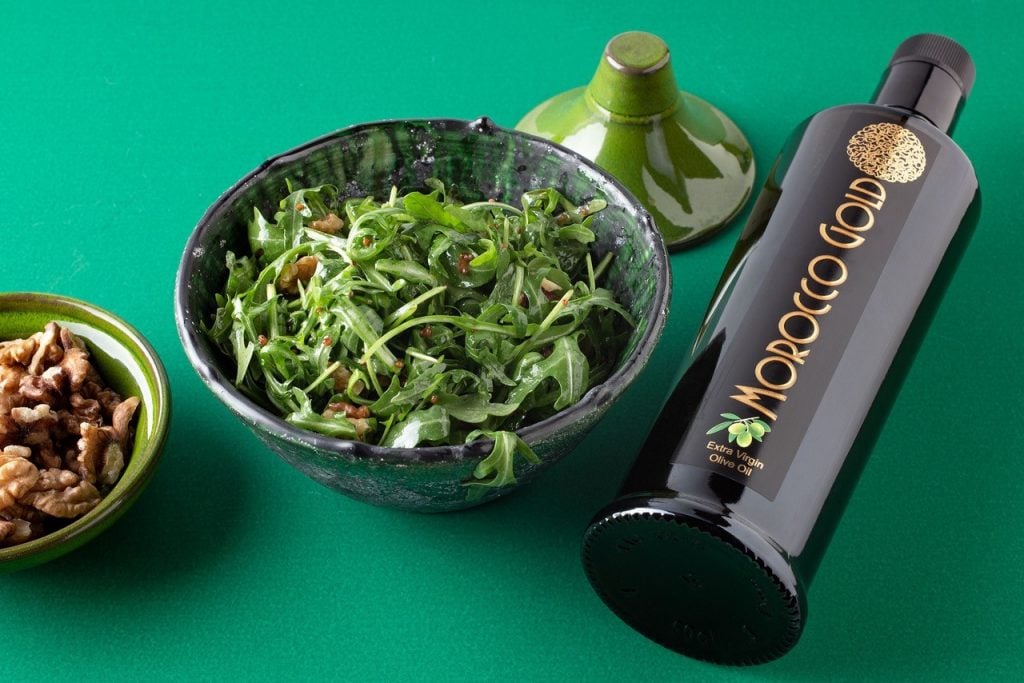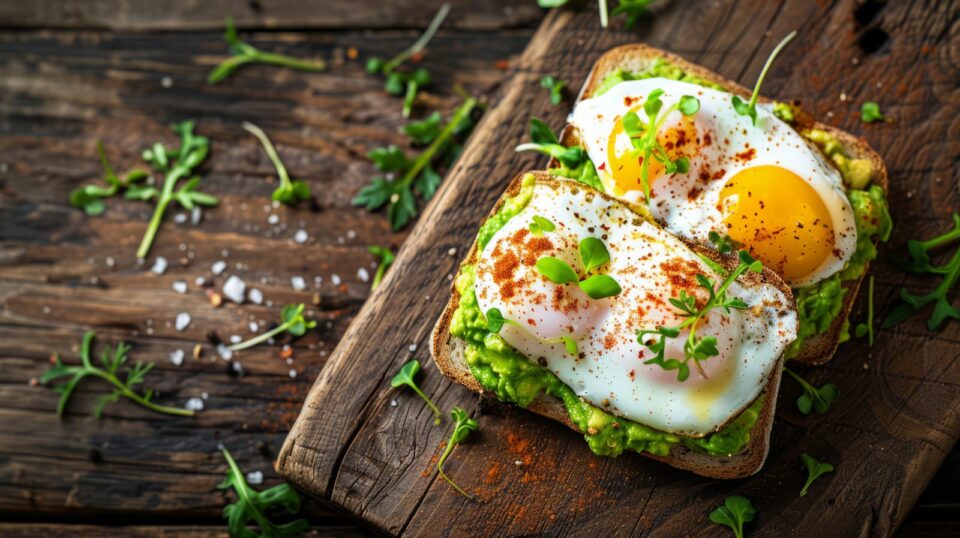Easy Wellness Plan Wins With Olive Oil And The Mediterranean Diet
Updated November 19th 2024

Summary
- Five years on Morocco Gold extra virgin olive oil reminds you of the top five ways you can use extra virgin olive oil in your diet.
- Selecting the right type of olive oil and storing it well are both key to maximising the health benefits and taste of extra virgin olive oil.
- Olive oil makes a great substitute for butter – just be careful to get your quantities right.
Contents
Have you heard the news? Morocco Gold are celebrating five years of producing the best extra virgin olive oil in the business! We’re marking the event with lots of fun fives and this time we’re looking at Five top tips for using extra virgin olive oil on The Mediterranean Diet.
With its robust flavor and myriad health benefits, Extra Virgin Olive Oil is more than just a cooking ingredient—it’s a lifestyle enhancer. This blog is crafted for healthy eaters, home cooks, and nutrition enthusiasts looking to fully immerse themselves in the Mediterranean way of dining. You’ll discover how to optimize your use of this nutrient-rich oil and ensure your meals are as flavorful as they are nutritious.
When it comes to perfecting your own Wellness Plan, incorporating the principles of The Mediterranean Diet is a great way to start. And a quality extra virgin olive oil is a core part of The Mediterranean Diet. But what are some of the most important things to remember to get the most from extra virgin olive oil on The Mediterranean Diet?
Be Careful With How Much Olive Oil You Use.
A generous drizzle of olive oil can transform a dish, but it’s crucial to remember that even healthy fats add calories to your meals. One tablespoon of olive oil contains about 120 calories. For those mindful of calorie intake, being careful with the amount you use is key.
Start by measuring your olive oil. This prevents over-pouring and ensures you’re adhering to your dietary goals. Consider using a spray bottle or small pourer to control the flow. These tools help you add just the right amount of oil, allowing you to maintain the integrity of your diet.
Remember, a little goes a long way. Olive oil’s intense flavor means you don’t need much to make a dish shine. Especially when making a salad dressing, sauce, or marinade, you’ll find a few teaspoons may be all you require.
According to an excellent rundown of top tips for using olive oil in the Mediterranean Diet from Dummies.com, keeping an eye on quantity is essential. Although the oils typically associated with the Mediterranean diet are healthier than other oils, they can turn your healthy strategy into an unhealthy one quickly if you aren’t careful. As with any fat, you don’t want to consume large amounts.
Pick Your Type Of Olive Oil Carefully.
The aisles of grocery stores are lined with a myriad of olive oils, each labelled and marketed differently. Not all oils are created equal, however. Extra virgin olive oil is prized for its high-quality and minimal processing, making it the healthiest choice.
Opt for cold-pressed oils like Morocco Gold when shopping. This method of extraction preserves the nutrients and antioxidants found in olive oil. Check for certifications like the PDO or PGI designations, which guarantee authenticity and quality.
Evaluate the origin of the oil. Oils from countries like Italy, Spain, and Greece often reflect traditional methods of production, yielding quality products. Reading labels carefully will help ensure you’re getting a product that meets your culinary needs.
At Morocco Gold, we never get bored of answering this question as we passionately believe in the power of making the best olive oil choice you can. Olive oil is a healthy, delicious option to cook with, but not all olive oils are created equal. It’s important to choose the right type of olive oil for your needs. According to the International Olive Council, there are five different grades of olive oil, each with clearly defined standards. This at-a-glance guide from Morocco Gold takes you through the key types and what you need to know about each.

Keep your olive oils in a cool, dark cabinet away from sunlight and heat.
Proper storage ensures your olive oil stays fresh and flavourful for as long as possible. Heat, light, and air are enemies of olive oil, leading to oxidation and rancidity.
A cool, dark cabinet provides the ideal environment for your oil. Consider using a tinted glass bottle to further protect from light exposure. This small step preserves the vibrant flavours and health benefits of the oil over time.
Keep the cap securely closed when not in use. Exposure to air can deteriorate the oil, affecting its taste and quality. By following these guidelines, you ensure your EVOO remains a vibrant addition to your meals.
So, you have gone to all the effort of researching and buying the best quality extra virgin olive oil you can find. Now you just need to look after it well! You can also store your main cooking oils, such as basic olive oil or canola oil, in the refrigerator but please don’t keep a high-quality extra-virgin olive oil in the refrigerator, If you store your olive oil in the fridge, it will eventually solidify, and condensation will promote oxidation. And oxidation is not good for extra virgin olive oil! So keep it away from the fridge to improve the olive oil use by date.
You can use olive oil instead of butter.
Olive oil’s versatility extends beyond traditional Mediterranean dishes. It can serve as an excellent substitute for butter or other fats in cooking and baking. This adds a unique flavor dimension and reduces saturated fat intake.
Try swapping olive oil for butter in your baked goods. Not only does it impart a subtle fruitiness, but it also keeps cakes and muffins moist. If a recipe calls for one cup of butter, replace it with three-quarters of a cup of olive oil.
Use olive oil for sautéing and roasting vegetables. Its naturally rich flavor enhances the taste of foods while offering a healthier alternative to butter or other cooking oils.
If you’re a keen baker or just fancy replacing butter with olive oil, you need to use about only three-fourths the amount of fat that the recipe calls for. For example, if the recipe calls for 2 tablespoons butter, use 1-1/2 tablespoons olive oil; if it requires 1 cup butter, use 3/4 cup olive oil, and so on.
Don’t Stress About Smoke Points When Using Extra Virgin Olive Oil.
There’s a common misconception that extra virgin olive oil isn’t suitable for high-heat cooking due to its smoke point. The reality? Its smoke point—typically between 350 and 410 degrees Fahrenheit—is sufficient for most home-cooking techniques.
Extra virgin olive oil’s high polyphenol content makes it more stable than many other oils at cooking temperatures. These antioxidants help prevent oil breakdown, ensuring your meals are flavorful and nutritious.
Don’t hesitate to use EVOO for frying or grilling. Its rich flavor enhances dishes, and its health benefits outweigh those of other cooking fats. Dispel the myths; trust in EVOO’s versatility and stability in your kitchen.
Concerns over the smoke point of extra virgin olive oil is something you read a lot online. But fear not! According to The Mediterranean Dish, Extra virgin olive oil has a smoke point of between 374 and 405 degrees F (190 to 207 degrees C). While this is a bit lower than other oils, it is still safe to cook and even bake with quality EVOO. Good quality EVOO will also have a higher smoke point than its lower-quality counterparts. And we agree. Morocco Gold is a great choice for many cooking methods as its smoke point is somewhere around 374 – 405 °F (190–207°C). As explained by the Olive Wellness Institute, Extra Virgin Olive Oil contains high levels of natural antioxidants. These antioxidants protect the naturally stable oil when heated, making Extra Virgin Olive Oil a very health option to cook with (including deep frying, pan frying, sauteing and oven baking).
